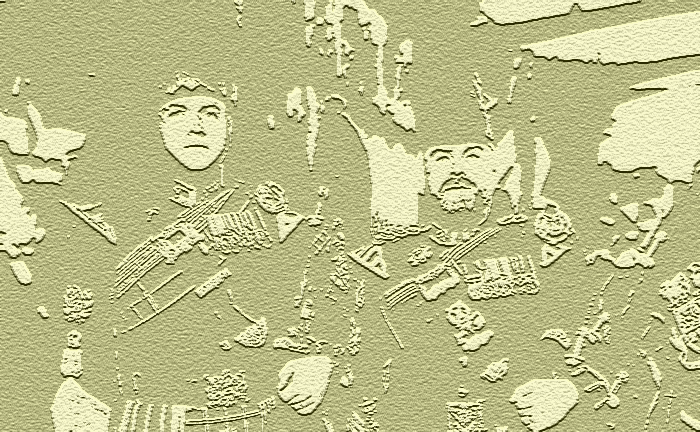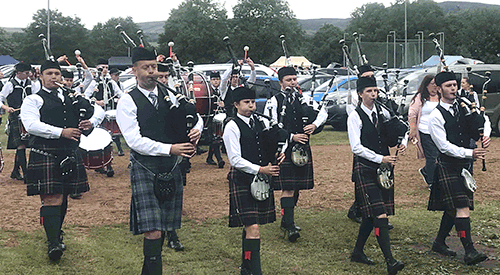
By Robert Wallace
The central problem in Army piping is that pipers are not considered musicians. They are soldiers first. This is not the case with their counterparts in the military bands. They are musicians, front and centre.
Pipe Majors are constantly having to justify their existence to unsympathetic senior officers. Come parade time, sure they want to be proud of their Pipes & Drums.
That’s different; the world and Royalty are watching, no slip ups lads, our good name’s on show. But when the pomp and ceremony is over it’s back to the grind of military duty and a life as a secondary musician.
Is it any wonder, then, that star Pipe Majors such as Peter MacGregor and Ben Duncan decide that they’ve had enough?
Of course these young men may have wanted a change anyway. And they are both very grateful to the Army for their careers, the experience gained, the travel the military has given them. They’ve walked into good jobs in civvy street as a result.
But it really sticks in the craw to see pipers (and drummers) viewed as lesser mortals, less deserving of professional consideration than the guy on the tuba. Until that changes the Army will struggle to keep and attract the very best players.
Check out this quote: ‘Although military musicians rarely see active combat, on some occasions they may be deployed to conflict zones…’
Remember the Royal Scots Dragoon Guards trying to keep their pipes safe and sand free in their tanks during the last desert war?
Yet it is not necessarily the Army alone that is at fault. There is a wider societal view of piping which needs to change. Yes, progress has been made. Folk groups and degree courses, Standard grades and Highers have all played a significant role in elevating piping in the eyes and ears of the public.
Respect for our instrument is higher than in the immediate post WW2 period. But at the administrative heart of our schools, in education? As Alex Duncan of the Scottish Schools Pipes and Drums Trust outlined at a new piping forum last Monday, the situation, with a few exceptions, is dire.
Without the support of her Trust there would be almost no money at all for piping in our schools. The whole of Glasgow has only one piping tutor. I can’t remember exactly where, but she said that the music budget for one school in the south of Scotland was £750 for the whole year.
Yet as the RSPBA’s Education Officer Pat Whelan pointed out to the meeting, the World Pipe Band Championsips alone generate some £15m for the Scottish economy. Why is it then, said I, that so little of it finds its way back to our schoolkids?

The forum was chaired by Duncan Byatt of the Highland Society of London. It comprised the great and the good from the piping and pipe band worlds. It so happened that Alex sat next to Pat. Here we have the nub of the problem side by side, said Duncan, quick to realise the forum had stumbled on its mission.
It has become the norm to be wary of everything Chinese these days, and not without good reason. But there is one aspect of that vast country that should attract our unequivocal admiration – its attitude to music and its traditional musicians.
They are venerated, admired, viewed as cultural giants in their own land. Music teachers are state paid and held in high esteem. A while ago I travelled and worked among them. It was clear to me how far behind we were. No child who wants to learn erhu or piano, is turned away. Look around the music schools and junior orchestras in this country today and you will see the fruit of that approach and attitude.
I do not ask for much, simply that every child in this country who wishes to learn the national instrument is given the opportunity to do so. Is it too much to expect that some of the money from the Worlds finds its way into the classroom?
Until the instrument achieves a far higher reach among the powers in mainstream education and HM Forces it will remain a second class pursuit, useful and twee, but to them, never properly serious.















Excellent timing Robert for your piece on the perception of the piper and music on the Great Highland Bagpipe. In Northern Ireland this second class musical instrument has never experienced more trying times.
From 1977 – 2005 I had the privilege, along with a first class team of tutors, of being involved with Monkstown / Mossley Schools where a pipe band project was successfully pursued. By the way all tutors gave their time free. Financial support was available from the North Eastern Education and Library Board for some instruments initially and assistance was given toward travel for a special trip to Australia during the Bic-centennial year in 1988. However band members and their parents footed the bill for everything else. So, and I referred earlier to a second class instrument, perhaps I should have used the term bottom of the class.
What tell me is second class about teaching a constructive use of leisure time or introducing a hobby that could last a lifetime, or teaching the fundamentals of music theory, or through participation with others learn the skills which are required in work situations and society in general. It would be so easy to continue but I, having enjoyed playing this super instrument for 69 years to date, simply claim the Great Highland Bagpipe has served its time and deserves to be rated as an instrument worthy of the highest recognition and ranked along with other instruments such as brass, flute, string, or orchestral percussion.
Keep her lit !
I’m so glad you have written this article. Piping in the state schools in Scotland and support by the Government for Scottish Arts generally is something that deeply concerns me, too. I wrote previously about growing up in the Highlands and learning Portsmouth on a recorder when, from the school, you could literally see the “Haughs of Cromdale”. Why not chanters? Why not our own music? I wondered if it was part of a centuries-old legacy to stamp out the Highlander. (The Government had banned us from speaking the Gaelic in the 1920s.)
I live in the US now and my sons are learning bagpipes, fiddle and drumming at the School of Scottish Arts in New Hampshire. Lezlie Webster is a phenomenal teacher and through her and the music, we all feel more closely connected to our Scottish identity than I have ever felt in my life. When my younger son began fiddle lessons with the equally incredible fiddle and dance teacher, Marielle Webster, I found that we were all firmly planted back in Strathspey. My son is learning Angus Cumming’s Collection of tunes, many being named after farms in the Strathspey Valley that surrounded me as a child (eg. Clurie’s Reel – now known as The Smith’s a Gallant Fireman). Never knew. Never heard of him at school. We were too busy singing How Many Flowers Grow in an English Country Garden. Yes, it fairly sticks in my craw, too.
I often wonder what the situation would be if we had remained in Edinburgh. I suspect I would have to send them to a private, fee-paying school if I wanted to try to mirror their experiences here. Not an option for us, or the majority, I think. Is our music being removed from the “masses”? Is it to be enjoyed by a select few who can afford it? Is this another example of our great British class system at work? What about the dancing, fiddling and drumming, too?
What do the facts tell us? Who is competing in the juvenile competitions run/sanctioned by the RSPBA? How many state schools are involved? Do we know the figures for solos?
What needs to be done?
I would just like to congradulate and wish Ben and Peter the best of luck. Ben and Petee have given so much to Army piping. They will be a very hard men to replace. Slainte Gentlemen!
This takes some explaining.
This to be fair goes deeper than the military, although the points are well made. I do a little bit of teaching at a school, the music part which I am involved in is an annex to the main school. This annex is primarily accommodating classical music teaching and “Scottish Traditional” music is included. There is and have been pipers at the school. The music teachers at this annex are contracted in to do the teaching as opposed to the Music Teachers employed by the Education Authority. However, as there are Music Teachers employed by the Education Authority, the pupils from the Music School annex would be entitled and get an input from the Education Authority Teachers, thus the pupils may be getting multiple teachers. It sounds good and maybe it is until piping is considered.
Formal assessments of pupils within the school are done by the Music Teachers employed by the Education Authority in regards to “O” levels etc and not by the teachers employed in the Music School. An independent piping assessor does attend of course for the final assessment.
Thus what is taking place at “my” establishment is that a Teacher/Assessor who admittedly has little or no knowledge of the intricacies of bagpipe music or indeed how the instrument is handled or blown assesses a pupil who plays the bagpipe. Of course this assessor is a Musician and the notion is that they can assess any player of any instrument, sufficient to consider as to whether they are at a standard for ‘O’ or Higher level.
I have briefly addressed this but really to no avail. There is a complete misunderstanding of the situation by authorities.
This is as suggested is as much societal problem as anything else.
This is the best article I have read about these subjects. Absolutely spot on I believe.
I could elaborate with my own experience’s, however, the generalised content says it all.
I hope not to offend with my comment, for I am an outsider. I believe the comparison with the Chinese only holds water if we are talking about ceol mhor, the authentic traditional music of the Highlands.
Great little article about the piping in the Army and in Scottish Schools .
I do have to challenge the outdated quote you used though . “Although military musicians rarely see active combat” , this sadly has not been the case for many years, in fact with the Argylls who I served with from 1989- 2020 it was never the case , with my own experience with my last 2 tours of Afghanistan at no point did anyone say “your a piper or drummer we won’t put you to the front line , I was as with every other piper/drummer judged on specialist soldiering ability alone and we’re crucial to any Fighting company’s fire power due to is being a heavy weapons platoon , Then as you commented on straight back from a 6 or 7 month fighting operational tour with unsympathetic Command structure to be expected to pick up pipes with fingers like feet and March through towns or if you lucky enough to have a good Commanding Officer you may be allowed to compete , the Army simply now want a gala band to make a noise , that’s the reality , if you want a chance of competing in the Army it’s now only the Highlanders being allowed or are capable of going out and doing reasonably well .
I think you make my point for me Scott. The ‘military musician’ referred to is not a piper!